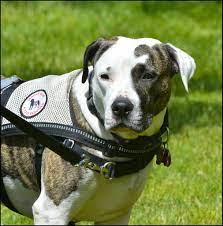“Unmasking the Ethical Quandary: The Misuse of Service Dog Vests in Our Parks and Public Spaces”
In the midst of a vibrant summer day at a local park, I found myself observing a scene that stirred both curiosity and concern within me. As I leisurely strolled through the park, taking in the laughter of children, the chirping of birds, and the fragrant aroma of freshly mowed grass, my attention was abruptly drawn to a group of individuals and their canine companions. It was not the typical sight of dogs joyfully playing fetch or splashing in the nearby pond that caught my eye, but rather the conspicuously placed service dog vests adorning some of these four-legged companions. Intrigued and somewhat baffled by this spectacle, I couldn’t help but overhear snippets of conversation from nearby park-goers, boasting about how they had acquired these vests and what it would enable them to do with their pets. It soon became apparent that these individuals were misrepresenting their dogs as service animals, a practice that, despite its unethical nature, seemed to be gaining popularity. This encounter left me pondering the ethical considerations surrounding the misuse of service dog vests and compelled me to delve deeper into the issue, exploring its implications on individuals with disabilities, society as a whole, and the integrity of the service dog community. In this exploration, I aim to shed light on the ethical dimensions of this controversial practice and the importance of upholding the rights and dignity of those who truly rely on service dogs.

Using a service dog vest on a dog that is not a legitimate service dog raises several ethical concerns. Service dogs play a crucial role in assisting individuals with disabilities and are protected by law to ensure they can access public spaces and receive the necessary accommodations. Misrepresenting a pet as a service dog undermines the rights of individuals who genuinely rely on service dogs and can have negative consequences for society as a whole.
Misrepresentation
In the context of falsely claiming a pet as a service dog, is a deeply concerning ethical issue with far-reaching consequences. At its core, this practice involves individuals deliberately misrepresenting the nature and purpose of their canine companion. Such deception is underpinned by dishonesty and a disregard for the fundamental principles of truthfulness and integrity. One of the most significant ethical concerns associated with misrepresentation is the distortion of the dog’s true purpose. Service dogs undergo rigorous training to provide essential assistance to individuals with disabilities, whether physical, sensory, or emotional. These highly trained animals are meticulously prepared to execute tasks that mitigate the challenges their handlers face daily. Tasks can include guiding individuals with visual impairments, alerting those with epilepsy to impending seizures, or offering emotional support to those with psychiatric conditions.
When a pet is falsely presented as a service dog, it not only belies the extensive training and discipline that legitimate service dogs receive but also compromises the genuine needs of individuals with disabilities. This deception results in a profound misalignment between the dog’s actual abilities and the expectations placed upon it in public spaces, potentially putting both the pet and others at risk.
Furthermore, the act of misrepresenting a pet as a service dog can be perceived as a form of fraud. By deliberately misleading others about the dog’s status and training, individuals engage in a deceptive act that can lead to the wrongful accrual of privileges and access to spaces and accommodations reserved for those with disabilities. This not only unfairly exploits the system but also threatens the rights and dignity of individuals who genuinely rely on service dogs.
The misuse of service dog vests has tangible and detrimental consequences for individuals with disabilities. It directly undermines the rights and well-being of those who genuinely depend on the assistance of service animals, leading to a cascade of challenges and impediments for them.
When individuals misuse service dog vests and pass off their untrained pets as legitimate service dogs, they directly compromise the rights and dignity of those who genuinely rely on these animals. Here’s how this occurs:
Access to Public Spaces: One of the primary purposes of service dogs is to assist their handlers in accessing public spaces and participating in society on an equal footing with others. Misrepresentation erodes this fundamental right by creating skepticism and confusion among business owners, landlords, and the general public. As a result, individuals with disabilities may encounter unnecessary resistance or denial of access to public places, infringing on their freedom of movement and participation in the community.
Accommodations: Legitimate service dogs are not merely allowed but are legally entitled to accompany their handlers in various settings, including restaurants, public transportation, and housing accommodations. Misrepresentation can lead to misjudgments about a dog’s behavior and capabilities, making it more challenging for those with disabilities to secure the accommodations and services they require. This can isolate them and hinder their ability to lead independent lives.
Social Stigma: The misuse of service dog vests contributes to the stigmatization of individuals with disabilities. It fosters misconceptions and biases, leading to unwarranted scrutiny and judgment. Such discrimination not only affects individuals on a personal level but also perpetuates societal barriers that individuals with disabilities have been fighting to break down for decades.
In some jurisdictions, falsely claiming a pet as a service dog can lead to legal consequences, including fines or penalties. This not only reflects poorly on the person who misrepresents their pet but also puts the pet at risk.
Impact on genuine service dogs
The presence of misbehaving or untrained dogs in public spaces can disrupt the crucial work of legitimate service dogs, posing serious risks to both the handler and the animal. Service dogs are meticulously trained to remain focused on their handler’s needs and to perform specific tasks on command. They are trained to ignore distractions and stay alert to potential dangers. When untrained or misbehaving dogs are introduced into the same environment, they can become a source of distraction and disruption. The presence of these dogs may divert the attention of genuine service dogs, compromising their ability to perform critical tasks that ensure the safety and well-being of their handler. Service dogs are often responsible for tasks that involve the safety of their handler, such as guiding individuals with visual impairments, alerting to seizures, or providing stability for those with mobility issues. A misbehaving or aggressive dog can pose a significant safety hazard. It may inadvertently lead to accidents, collisions, or even injuries to the handler. The potential consequences of such disruptions can be severe, particularly in situations where split-second decisions and precise actions are crucial. Service dogs are not only trained to perform physical tasks but also to provide emotional support to their handlers. They are trained to sense and respond to their handler’s emotional state. The presence of unruly or aggressive dogs can cause stress and anxiety for both the service dog and its handler. This can diminish the effectiveness of the service dog’s emotional support role and negatively impact the handler’s overall well-being. In some cases, misrepresenting a pet as a service dog may involve animals that are not adequately socialized, trained, or prepared for public environments. This can expose the misrepresenting pet to stressful situations and potentially dangerous encounters. Genuine service dogs undergo extensive training to prepare them for the unique challenges of public spaces, and their safety and well-being are paramount.
The accessibility and affordability of service dog vests, obtainable for less than $10 through online marketplaces, have raised significant ethical concerns. The presence of such low-cost and easily attainable vests creates a complex dilemma, balancing the legitimate needs of individuals who rely on service dogs and the risk of misuse by others. While it is undeniably essential to ensure that individuals with disabilities have access to the necessary equipment to facilitate their daily lives, it is equally critical to address the potential for abuse and misrepresentation in the realm of service dogs. Therefore, it becomes imperative to explore and advocate for stricter regulations and enhanced control over the sale of these items. The ease with which service dog vests can be obtained for a mere pittance has created an alarming trend of individuals attempting to pass off their pets as legitimate service dogs. This deceptive practice, driven by the allure of unfettered access to public spaces and accommodations, undermines the credibility of the entire service dog community. It jeopardizes the rights of those who genuinely depend on these animals and fosters a climate of skepticism and distrust towards service dog handlers.
To address this issue, there is a compelling argument in favor of enhanced regulation and control over the sale of service dog vests. Such measures could include requiring buyers to provide proof of disability or documentation of their need for a service dog vest, which can be verified by a healthcare professional. Additionally, implementing mandatory training and certification programs for individuals to demonstrate their understanding of the responsibilities and ethical considerations associated with service dogs is essential. To deter and penalize misuse, strict consequences, such as fines or penalties, should be enforced against those caught misrepresenting their pets as service dogs. Collaboration with online marketplaces to monitor and regulate the sale of service dog vests is crucial, ensuring that only qualified buyers have access to these items and that they are used appropriately. These combined efforts aim to strike a balance between maintaining accessibility for those who genuinely require these vests and preventing their misuse, ultimately safeguarding the rights and dignity of individuals with disabilities and the integrity of the service dog community. By introducing and enforcing such regulations, the aim is not to restrict the rights of individuals with disabilities but rather to safeguard those rights from abuse and exploitation. Such measures would not only serve to protect the integrity of the service dog community but also promote ethical behavior and understanding among the general public. Ultimately, it is essential to strike a balance that ensures the continued accessibility of service dog equipment for those who genuinely require it while curbing the misuse that threatens to erode the legitimacy of this invaluable service.






